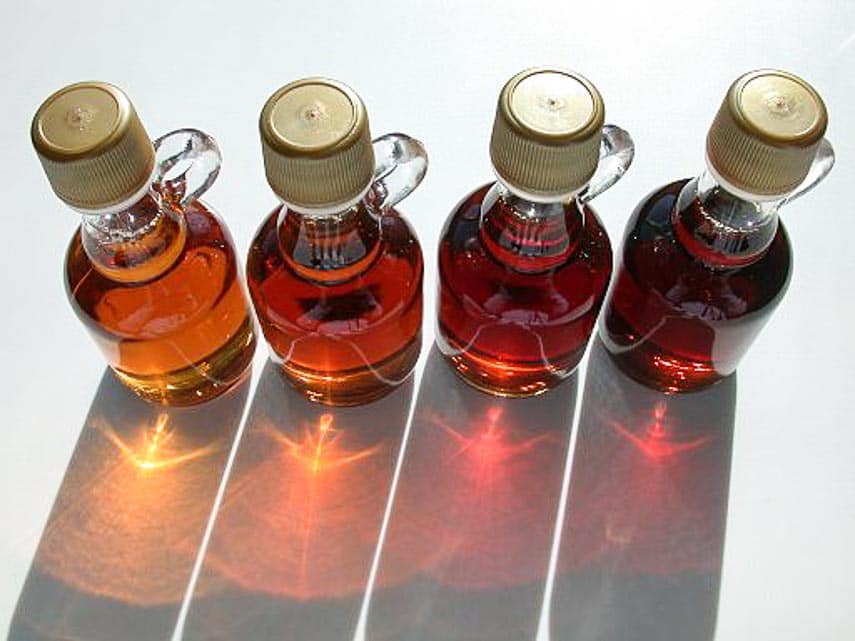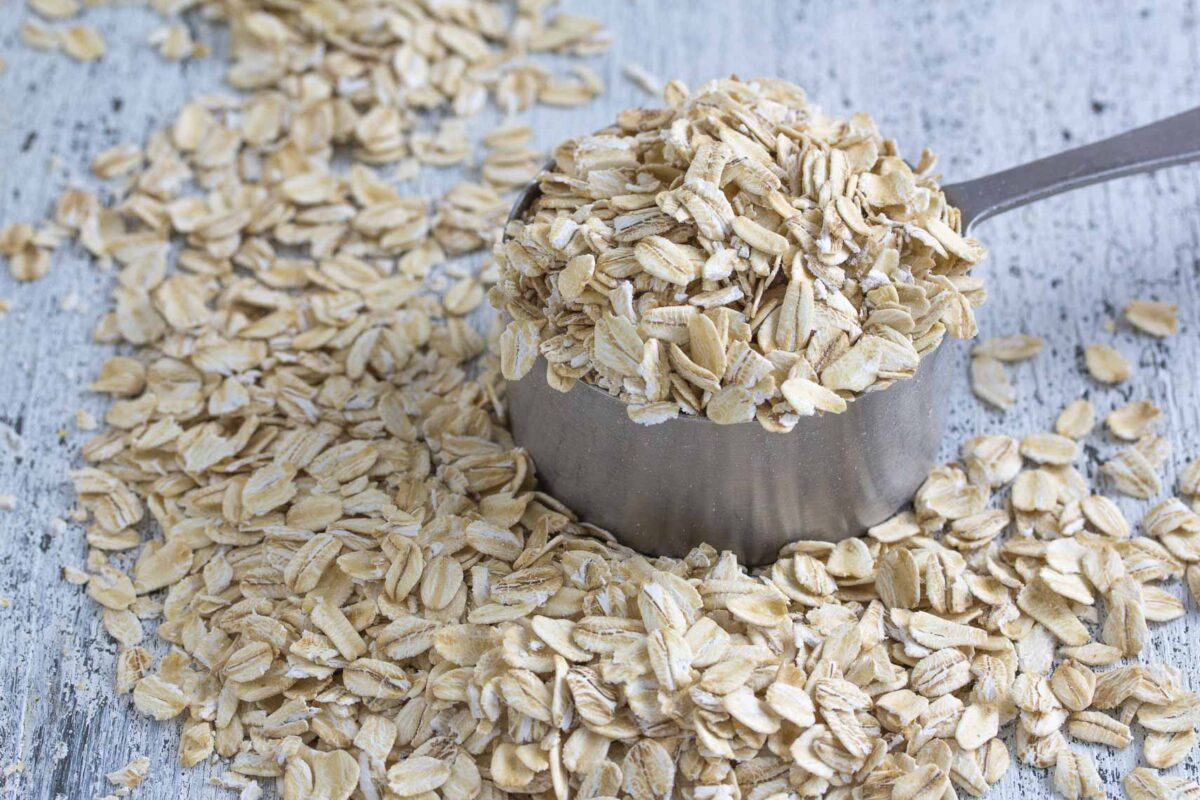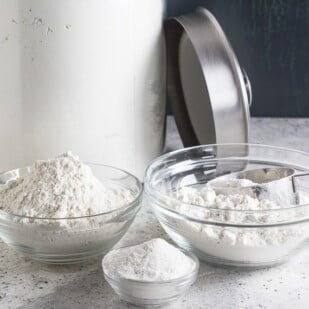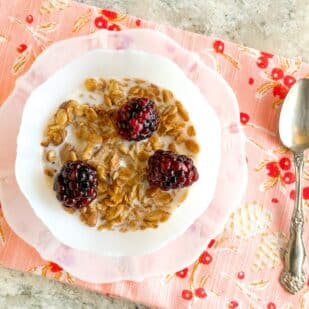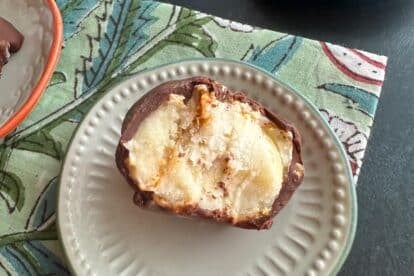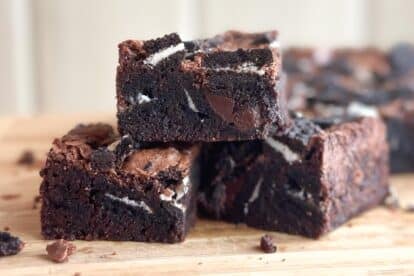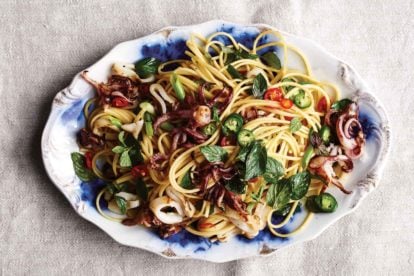Low FODMAP Nut-Free Granola is super simple: just stir the ingredients together in one bowl, spread on a sheet pan, bake, and you’re done! As with most granola recipes, this one is based on oats, but it is also nut-free, which many low FODMAP granola recipes are not. There are many nuts that are low FODMAP (and we have plenty of granola recipes for you that include them), but we know some of you want nut-free recipes.
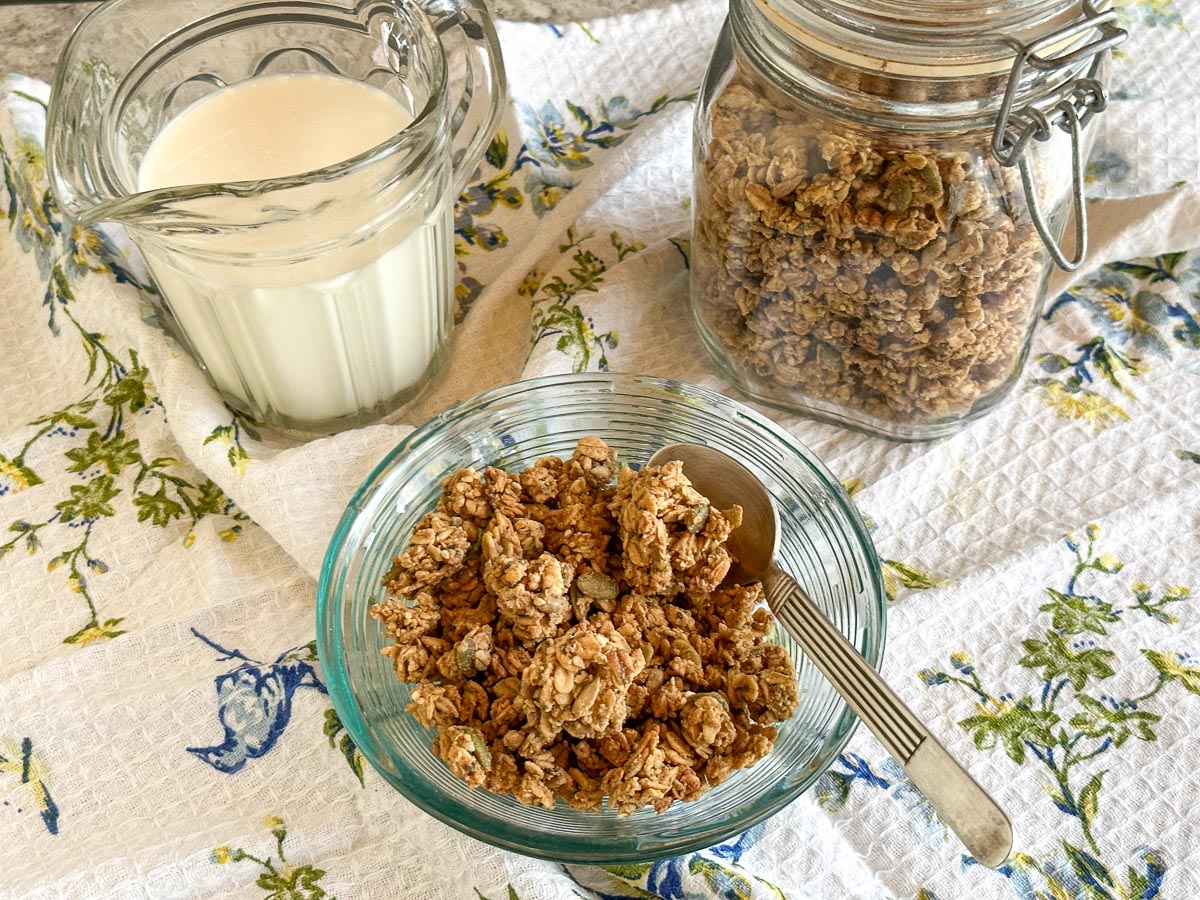
A combination of sunflower seeds and sunflower butter, pumpkin seeds, hemp seeds, ground flax seeds, chia seeds and sesame seeds, along with vegetable oil and maple syrup, and a bit of cinnamon combine to make a truly delicious Low FODMAP Nut-Free Granola.
We eat granola for breakfast, as well as for snacks. Try it with milk, alt milk, with low FODMAP yogurt, or eaten dry out of hand. Crunch, crunch!
You might also want to read our article, Our Favorite Homemade Gluten-Free & Low FODMAP Granola Recipes. We have several low FODMAP granola recipes for you!
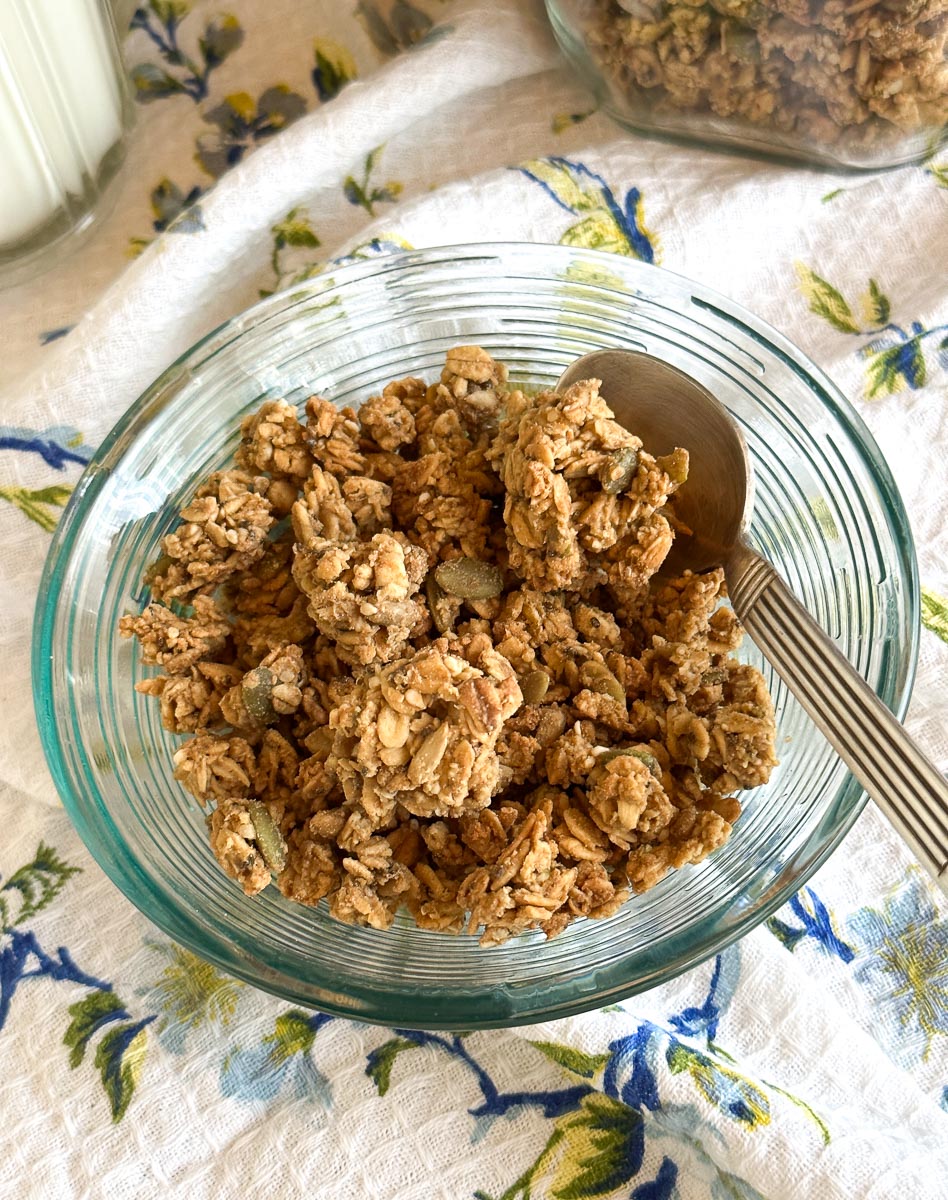
Frequently Asked Questions
Yes, granola can be low FODMAP if the ingredients and serving sizes are compliant with the low FODMAP diet. All of our granola recipes are low FODMAP according to ingredients as lab tested by Monash University and FODMAP Friendly and taking stacking into account.
Read our article, What Is FODMAP Stacking?
Yes, maple syrup is low FODMAP, and in fact contains no FODMAPs, due to its chemical makeup. Read more in our article, Explore An Ingredient: Maple Syrup. Make sure to use pure maple syrup and not “pancake syrup”.
Yes, oats have very generous serving sizes. You can read more in our article, Explore An Ingredient: Oats & Oatmeal.
You can substitute other low FODMAP nuts, such as pecans or macadamias, to this granola, if you take into account their low FODMAP serving sizes, and also take stacking into account. Any time you tweak a low FODMAP recipe you MUST recalculate the FODMAP load. Not everyone knows how to do this. If you are unsure, it is best to stick with our recipes as written and consume in the serving sizes suggested.
Yes, there is a low FODMAP serving size of sunflower butter – that has not been reported as of yet within the app. Monash has stated that up to 50 g of sunflower seeds are low FODMAP. We suggest seeking out unsweetened sunflower butter (that may have salt added, or not) and use that same amount as a guide for low FODMAP sunflower seed butter consumption. This equals 3 tablespoons (48 g) of sunflower butter.
In this recipe, the sunflower butter provides enough well and moisture, along with the maple syrup, to hold the granola together and to provide a delectable crunchy texture once baked.
How To Make Low FODMAP Nut-Free Granola
Position rack in center of oven. Preheat oven to 325°F (165°C).
Place oats, sunflower seeds, pumpkin seeds, hemp seeds, chia seeds, ground flax seeds, sesame seeds, cinnamon and salt in a large mixing bowl; stir to combine.
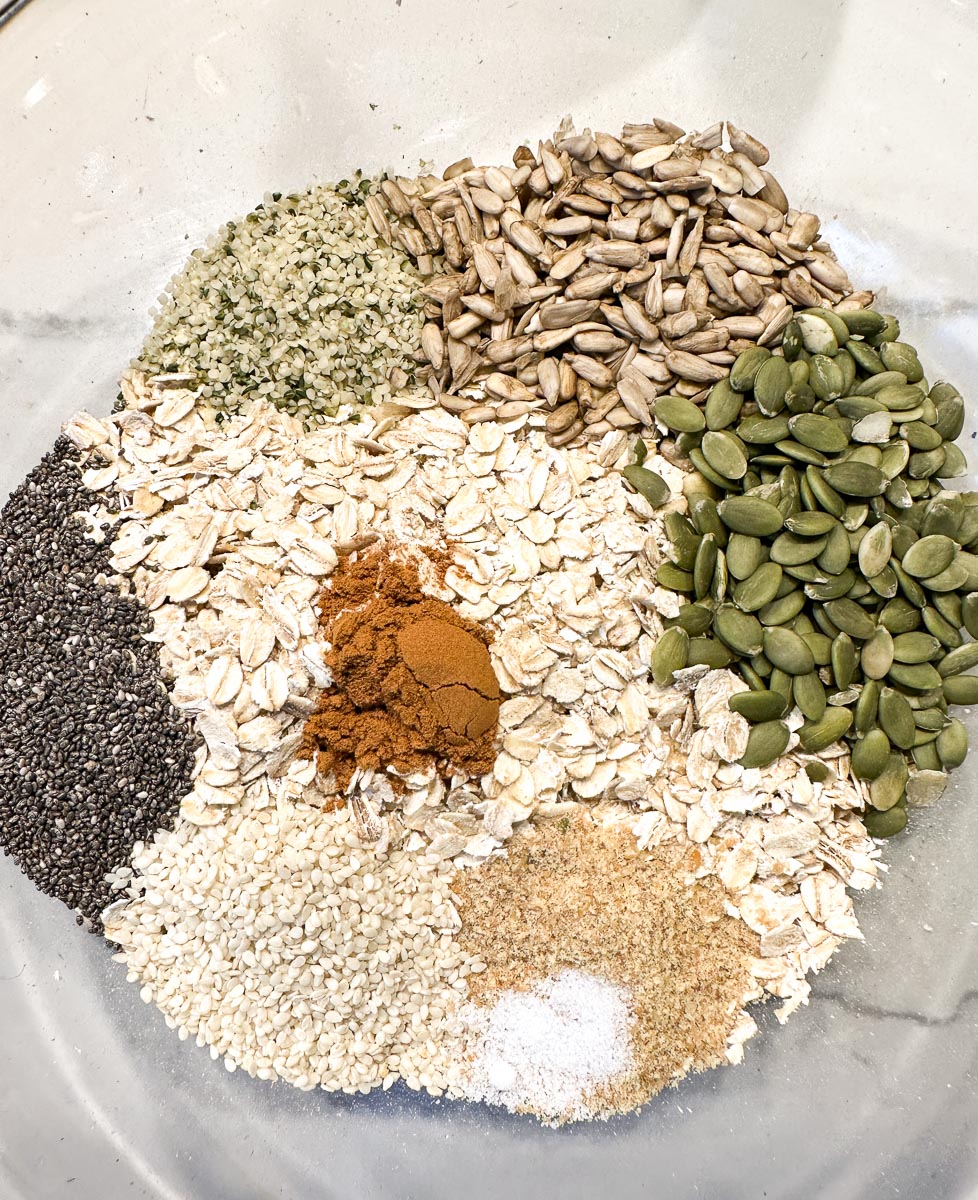
In a separate bowl, whisk together the maple syrup, sunflower butter and vanilla, then pour over dry mixture.
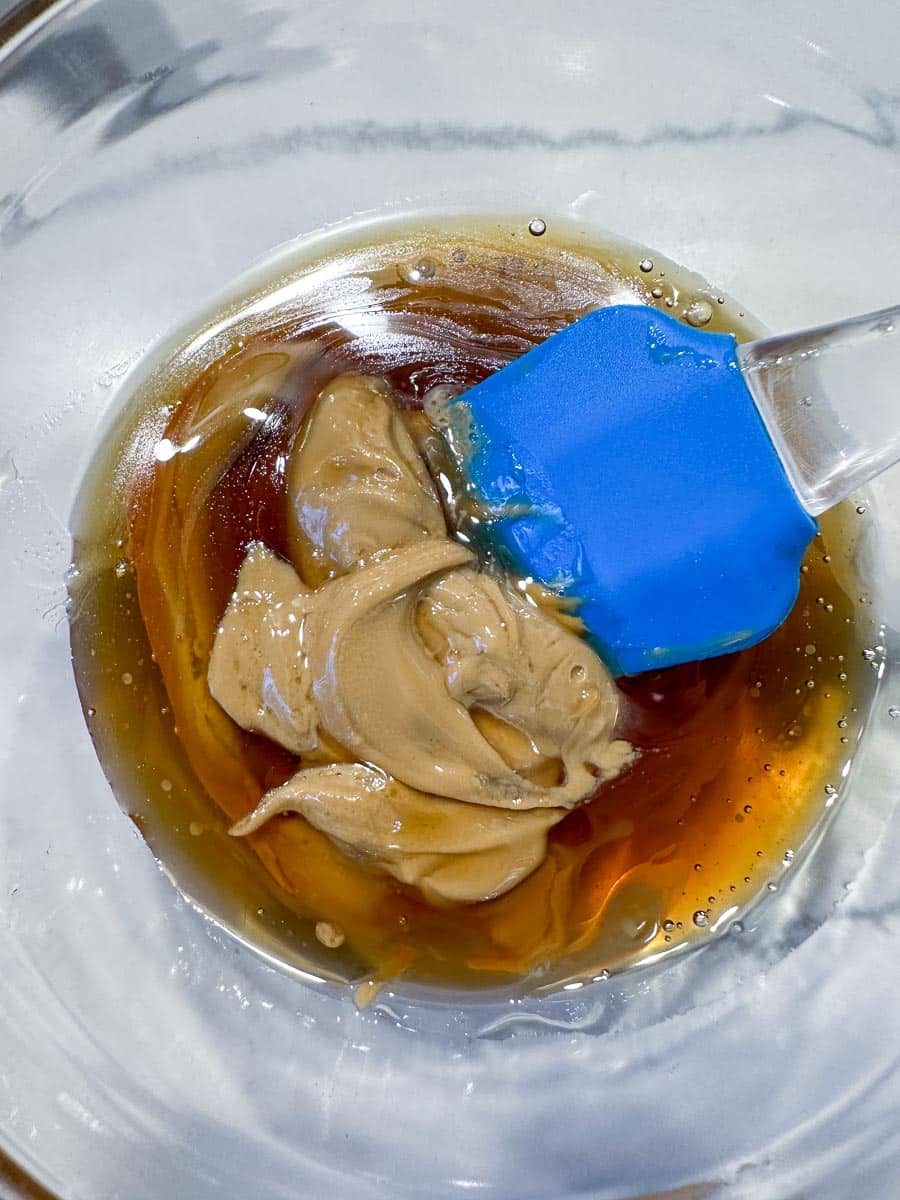
Stir together to evenly moisten and combine.
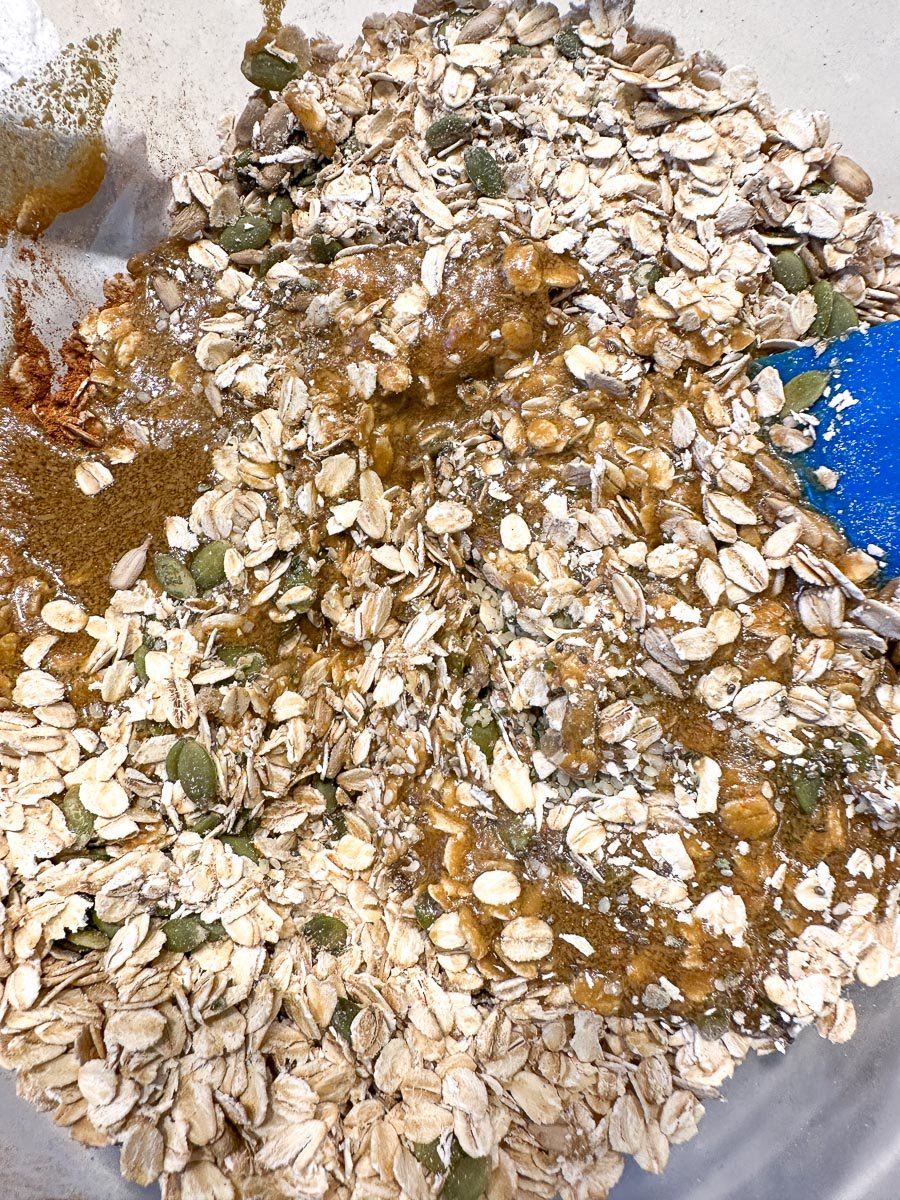
Spread out granola evenly on half-sheet pan.
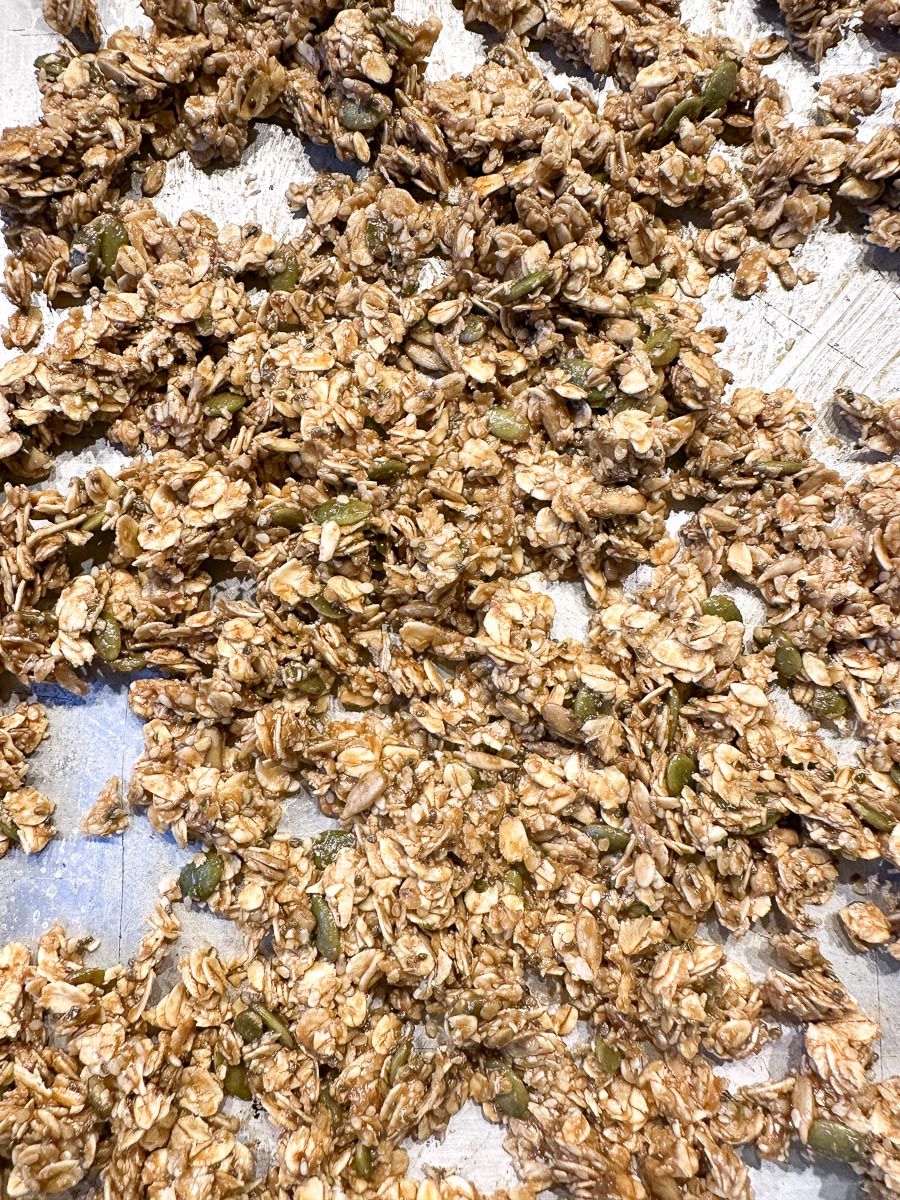
Bake for about 20 to 30 minutes total, stirring halfway through, until granola is light golden brown, crispy, dry, and fragrant. Watch carefully as it might brown more quickly than other granolas you might be used to making.
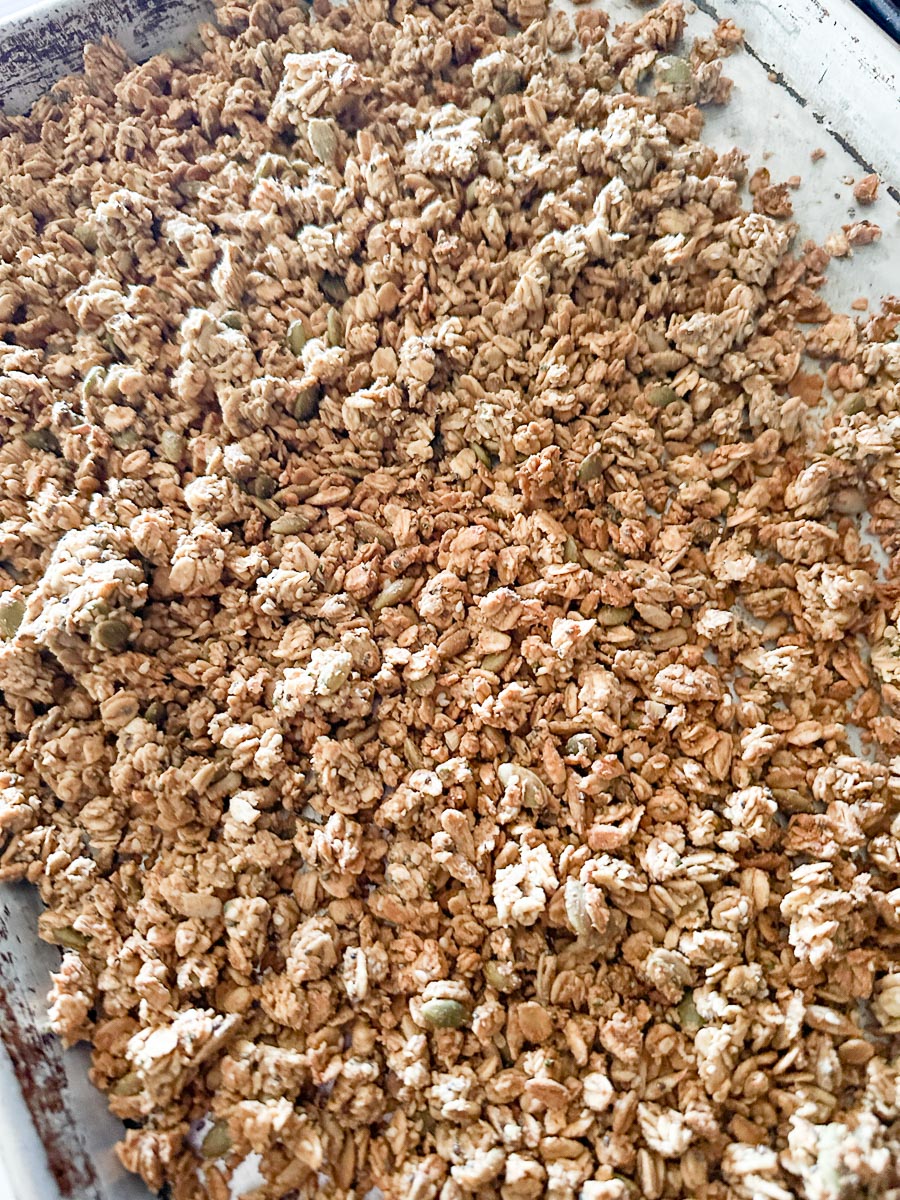
Remove pan from oven and allow granola to cool completely on pan, then store at room temperature in an airtight container for up to 1 month. You can also freeze for up to 3 months. We love it for breakfast with low FODMAP lactose-free milk or dairy-free milk, tossed onto yogurt or even eaten out of hand for a snack.
FODMAP Information
All recipes are based upon Monash University & FODMAP Friendly science at time of initial publication.
- Flax Seeds: Both Monash University and FODMAP Friendly have lab tested flax seeds (also called Linseeds). FODMAP Friendly gives them a “Pass” at 1 tablespoon or 14 g. Monash gives them a low FODMAP serving size of 1 Australian tablespoon at 15 g.
- Hemp Seeds: Both Monash University and FODMAP Friendly have lab tested hemp seeds. FODMAP Friendly gives them a “Pass” at 28 g. Monash gives them a low FODMAP serving size of 2 Australian tablespoons at 20 g.
- Maple Syrup: Both Monash University and FODMAP Friendly have lab tested maple syrup. Monash says that maple syrup is Green light and low FODMAP in servings of 2 Australian tablespoons (50 g). FODMAP Friendly gives it a “Pass” at 2 tablespoons (53 g). These amounts are recommended due to Australian healthy eating guidelines; no upper limit is posted by either Monash or FODMAP Friendly. Due to its chemical makeup, maple syrup contains more glucose than fructose and therefore can be considered free of FODMAPs. The FODMAP Friendly app does show you that no FODMAPs were detected in lab testing.
- Oats: Both Monash and FODMAP Friendly have lab tested oats. FODMAP Friendly gave rolled oats a “Pass” at ½ cup or 43 g servings; in an update to the app, they report Quick Oats as low FODMAP at 47 g, or ½ cup uncooked. Their max low FODMAP serving is 59.53 g. Monash has several app entries and some are country specific. Here we present their “basic” app entries which are not country specific (use your app to look up the other entries). For their main entry called “rolled oats” they say a Green Light low FODMAP serving is ½ cup, which they peg at 52 g. For “quick oats” they state that a low FODMAP serving is only ¼ cup at 23 g, becoming moderate Yellow Light at ½ cup or 47 g.
- Sesame Seeds: Monash University has lab tested white sesame seeds and they are low FODMAP in 1 tablespoon (11 g) portions.
- Spices: Many fresh and dried spice have been lab tested by both Monash University and FODMAP Friendly and are easily looked up in the apps, which we strongly suggest that you have. The additional good news is that if you are interested in a spice that has not been lab tested, you can look at the nutritional panel and assess its FODMAP load for yourself. If the “Sugars” and/or “Carbs” are 1 g or less per serving, then the item would be a good bet to try.
- Sunflower Seed Butter: Although not reported within the smart phone app, Monash has stated that up to 50 g of sunflower seeds are low FODMAP. We suggest seeking out unsweetened sunflower butter (that may have salt added, or not) and use that same amount as a guide for low FODMAP sunflower seed butter consumption. This equals 3 tablespoons (48 g) of sunflower butter.
Please always refer to the Monash University & FODMAP Friendly smartphone apps for the most up-to-date lab tested information. Foods will be retested from time to time; in the case of raw ingredients, such as fruits and vegetables, results may vary. All lab tested results are valid and represent a snapshot in time. As always, your tolerance is what counts; please eat accordingly. The ultimate goal of the low FODMAP diet is to eat as broadly as possible, without triggering symptoms, for the healthiest microbiome.
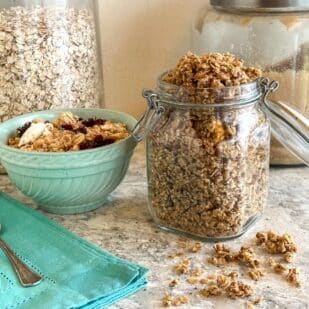
Low FODMAP Nut-Free Granola
Low FODMAP Nut-Free Granola is super simple: just stir the ingredients together in one bowl, spread on a sheet pan, bake, and you’re done! As with most granola recipes, this one is based on oats, but it is also nut-free, which many low FODMAP granola recipes are not. There are many nuts that are low FODMAP (and we have plenty of granola recipes for you that include them), but we know some of you want nut-free recipes.
Low FODMAP Serving Size: Makes 5 cups (486 g); 10 servings; ½ cup (49 g) serving size
Ingredients:
- 2 cups (198 g) old-fashioned rolled oats; use gluten-free if following a gluten-free diet
- ¼ cup (35 g) raw hulled sunflower seeds
- ¼ cup (30 g) raw shelled pumpkin seeds
- 2 tablespoons hemp seeds
- 1 tablespoon chia seeds
- 1 tablespoon ground flax seeds
- 1 tablespoon white sesame seeds
- 1 teaspoon cinnamon
- ¼ teaspoon salt, optional or to taste (depends on salt level of sunflower butter)
- 6 tablespoons (90 ml) maple syrup
- ¼ cup (64 g) unsweetened sunflower butter, with or without salt
- ½ teaspoon vanilla extract
Preparation:
-
Position rack in center of oven. Preheat oven to 325°F (165°C).
-
Place oats, sunflower seeds, pumpkin seeds, hemp seeds, chia seeds, ground flax seeds, sesame seeds, cinnamon and salt in a large mixing bowl; stir to combine. In a separate bowl, whisk together the maple syrup, sunflower butter and vanilla, then pour over dry mixture. Stir together to evenly moisten and combine.
-
Spread out granola evenly on half-sheet pan. Bake for about 20 to 30 minutes total, stirring halfway through, until granola is light golden brown, crispy, dry, and fragrant. Watch carefully as it might brown more quickly than other granolas you might be used to making.
-
Remove pan from oven and allow granola to cool completely on pan, then store at room temperature in an airtight container for up to 2 weeks. Serve with milk, alt milk, low FODMAP yogurt, or eat out of hand as a snack.
Notes:
FODMAP Information
All recipes are based upon Monash University & FODMAP Friendly science at time of initial publication.
• Flax Seeds: Both Monash University and FODMAP Friendly have lab tested flax seeds (also called Linseeds). FODMAP Friendly gives them a “Pass” at 1 tablespoon or 14 g. Monash gives them a low FODMAP serving size of 1 Australian tablespoon at 15 g.
• Hemp Seeds: Both Monash University and FODMAP Friendly have lab tested hemp seeds. FODMAP Friendly gives them a “Pass” at 28 g. Monash gives them a low FODMAP serving size of 2 Australian tablespoons at 20 g.
• Maple Syrup: Both Monash University and FODMAP Friendly have lab tested maple syrup. Monash says that maple syrup is Green light and low FODMAP in servings of 2 Australian tablespoons (50 g). FODMAP Friendly gives it a “Pass” at 2 tablespoons (53 g). These amounts are recommended due to Australian healthy eating guidelines; no upper limit is posted by either Monash or FODMAP Friendly. Due to its chemical makeup, maple syrup contains more glucose than fructose and therefore can be considered free of FODMAPs. The FODMAP Friendly app does show you that no FODMAPs were detected in lab testing.
• Oats: Both Monash and FODMAP Friendly have lab tested oats. FODMAP Friendly gave rolled oats a “Pass” at ½ cup or 43 g servings; in an update to the app, they report Quick Oats as low FODMAP at 47 g, or ½ cup uncooked. Their max low FODMAP serving is 59.53 g. Monash has several app entries and some are country specific. Here we present their “basic” app entries which are not country specific (use your app to look up the other entries). For their main entry called “rolled oats” they say a Green Light low FODMAP serving is ½ cup, which they peg at 52 g. For “quick oats” they state that a low FODMAP serving is only ¼ cup at 23 g, becoming moderate Yellow Light at ½ cup or 47 g.
• Sesame Seeds: Monash University has lab tested white sesame seeds and they are low FODMAP in 1 tablespoon (11 g) portions.
• Spices: Many fresh and dried spice have been lab tested by both Monash University and FODMAP Friendly and are easily looked up in the apps, which we strongly suggest that you have. The additional good news is that if you are interested in a spice that has not been lab tested, you can look at the nutritional panel and assess its FODMAP load for yourself. If the “Sugars” and/or “Carbs” are 1 g or less per serving, then the item would be a good bet to try.
• Sunflower Seed Butter: Although not reported within the smart phone app, Monash has stated that up to 50 g of sunflower seeds are low FODMAP. We suggest seeking out unsweetened sunflower butter (that may have salt added, or not) and use that same amount as a guide for low FODMAP sunflower seed butter consumption. This equals 3 tablespoons (48 g) of sunflower butter.
Please always refer to the Monash University & FODMAP Friendly smartphone apps for the most up-to-date lab tested information. Foods will be retested from time to time; in the case of raw ingredients, such as fruits and vegetables, results may vary. All lab tested results are valid and represent a snapshot in time. As always, your tolerance is what counts; please eat accordingly. The ultimate goal of the low FODMAP diet is to eat as broadly as possible, without triggering symptoms, for the healthiest microbiome.
Nutrition
All nutritional information is based on third-party calculations and should be considered estimates. Actual nutritional content will vary with brands used, measuring methods, portion sizes and more. For a more detailed explanation, please read our article Understanding The Nutrition Panel Within Our Recipes.
